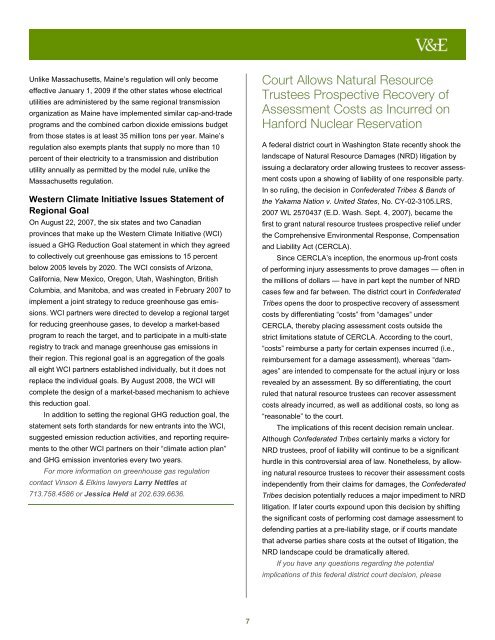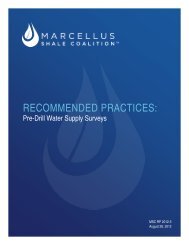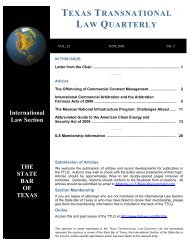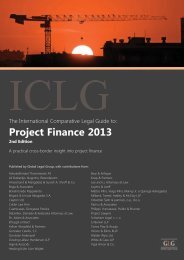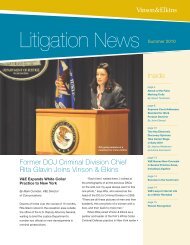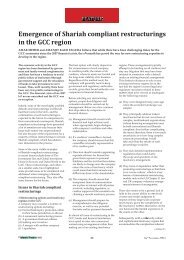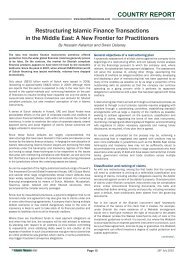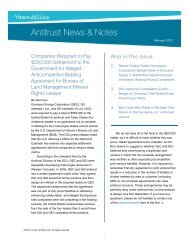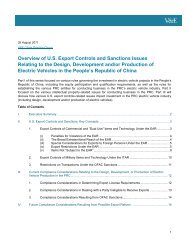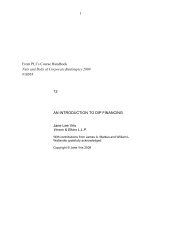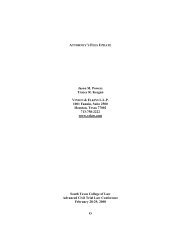Environmental News - Vinson & Elkins LLP
Environmental News - Vinson & Elkins LLP
Environmental News - Vinson & Elkins LLP
You also want an ePaper? Increase the reach of your titles
YUMPU automatically turns print PDFs into web optimized ePapers that Google loves.
Unlike Massachusetts, Maine’s regulation will only become<br />
effective January 1, 2009 if the other states whose electrical<br />
utilities are administered by the same regional transmission<br />
organization as Maine have implemented similar cap-and-trade<br />
programs and the combined carbon dioxide emissions budget<br />
from those states is at least 35 million tons per year. Maine’s<br />
regulation also exempts plants that supply no more than 10<br />
percent of their electricity to a transmission and distribution<br />
utility annually as permitted by the model rule, unlike the<br />
Massachusetts regulation.<br />
Western Climate Initiative Issues Statement of<br />
Regional Goal<br />
On August 22, 2007, the six states and two Canadian<br />
provinces that make up the Western Climate Initiative (WCI)<br />
issued a GHG Reduction Goal statement in which they agreed<br />
to collectively cut greenhouse gas emissions to 15 percent<br />
below 2005 levels by 2020. The WCI consists of Arizona,<br />
California, New Mexico, Oregon, Utah, Washington, British<br />
Columbia, and Manitoba, and was created in February 2007 to<br />
implement a joint strategy to reduce greenhouse gas emissions.<br />
WCI partners were directed to develop a regional target<br />
for reducing greenhouse gases, to develop a market-based<br />
program to reach the target, and to participate in a multi-state<br />
registry to track and manage greenhouse gas emissions in<br />
their region. This regional goal is an aggregation of the goals<br />
all eight WCI partners established individually, but it does not<br />
replace the individual goals. By August 2008, the WCI will<br />
complete the design of a market-based mechanism to achieve<br />
this reduction goal.<br />
In addition to setting the regional GHG reduction goal, the<br />
statement sets forth standards for new entrants into the WCI,<br />
suggested emission reduction activities, and reporting requirements<br />
to the other WCI partners on their “climate action plan”<br />
and GHG emission inventories every two years.<br />
For more information on greenhouse gas regulation<br />
contact <strong>Vinson</strong> & <strong>Elkins</strong> lawyers Larry Nettles at<br />
713.758.4586 or Jessica Held at 202.639.6636.<br />
Court Allows Natural Resource<br />
Trustees Prospective Recovery of<br />
Assessment Costs as Incurred on<br />
Hanford Nuclear Reservation<br />
A federal district court in Washington State recently shook the<br />
landscape of Natural Resource Damages (NRD) litigation by<br />
issuing a declaratory order allowing trustees to recover assessment<br />
costs upon a showing of liability of one responsible party.<br />
In so ruling, the decision in Confederated Tribes & Bands of<br />
the Yakama Nation v. United States, No. CY-02-3105.LRS,<br />
2007 WL 2570437 (E.D. Wash. Sept. 4, 2007), became the<br />
first to grant natural resource trustees prospective relief under<br />
the Comprehensive <strong>Environmental</strong> Response, Compensation<br />
and Liability Act (CERCLA).<br />
Since CERCLA’s inception, the enormous up-front costs<br />
of performing injury assessments to prove damages — often in<br />
the millions of dollars — have in part kept the number of NRD<br />
cases few and far between. The district court in Confederated<br />
Tribes opens the door to prospective recovery of assessment<br />
costs by differentiating “costs” from “damages” under<br />
CERCLA, thereby placing assessment costs outside the<br />
strict limitations statute of CERCLA. According to the court,<br />
“costs” reimburse a party for certain expenses incurred (i.e.,<br />
reimbursement for a damage assessment), whereas “damages”<br />
are intended to compensate for the actual injury or loss<br />
revealed by an assessment. By so differentiating, the court<br />
ruled that natural resource trustees can recover assessment<br />
costs already incurred, as well as additional costs, so long as<br />
“reasonable” to the court.<br />
The implications of this recent decision remain unclear.<br />
Although Confederated Tribes certainly marks a victory for<br />
NRD trustees, proof of liability will continue to be a significant<br />
hurdle in this controversial area of law. Nonetheless, by allowing<br />
natural resource trustees to recover their assessment costs<br />
independently from their claims for damages, the Confederated<br />
Tribes decision potentially reduces a major impediment to NRD<br />
litigation. If later courts expound upon this decision by shifting<br />
the significant costs of performing cost damage assessment to<br />
defending parties at a pre-liability stage, or if courts mandate<br />
that adverse parties share costs at the outset of litigation, the<br />
NRD landscape could be dramatically altered.<br />
If you have any questions regarding the potential<br />
implications of this federal district court decision, please<br />
7


